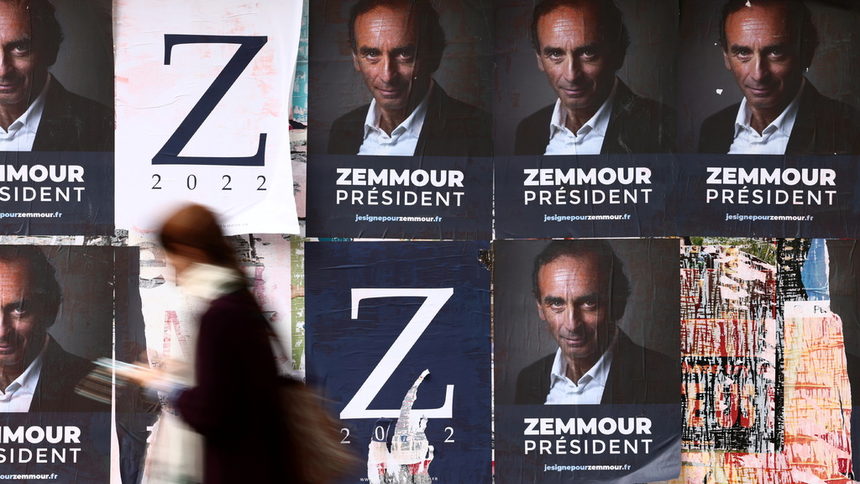His parents are from Berber Jews from Israel, but he wants all the “Nephrenic” small names in the country to change. With his positions, he makes Marin Le Pen look moderate, and at least one poll gives him second place in next year’s presidential election.
However, Eric Zemur did not even run for president. Journalist, commentator and well-known defender of far-right ideas, an opponent of immigration and Islam, he gave up his show because of a tour to present a book of great interest – La France n’a pas dit son dernier mot (“France has not yet said the last your word “) across the country. His tour of France continues today.
His presence has already stirred the political landscape in France and made the election – which would probably be a contest between President Emmanuel Macron and Le Pen – much more unpredictable.
Zemur, 63, was a political journalist at Figaro. In 2010, he was convicted of incitement to hatred (for saying that drugs are sold mainly by “blacks and Arabs”). The reason for stopping his broadcast is probably different: the French media regulator decided to classify him as a politician, not a journalist, and the broadcasting (and relatively new) television CNews must adhere to French standards for equal airtime for politicians.
“Prophet of pessimism” and “seller of the apocalypse” have been among the definitions for him since gaining popularity in recent years. His books on the risk of France’s disappearance and becoming an “Islamic republic” for a century if there is no solution to migration have actually sold very well in recent years. According to him, the Seine-Saint-Denis region “is no longer France”; there were so many people of Arab and African descent that it looked like “another continent.” The vision of “Christian Europe” and the “Christian roots of France” has permeated his discourse for years. As a child of Algerian Jews who moved to France, he describes himself as the embodiment of the example of successful assimilation.
The parallel that appeared in his latest book, between him and former US President Donald Trump, has prompted some journalists to call him “French Trump”. In just two weeks after its release on September 16, more than 130,000 copies were sold at Amazon.
He also wants to ban families in France from giving children “Nephrenic” first names – including so as not to call their children “Mohammed”, although they can use it as a surname. He believes in the “big swap” theory – shared by supporters of the white supremacy theory, but also by extremists convicted in Europe and elsewhere – that immigrants are taking the place of the Western population.
A month ago, Zemur announced that he was “considering” running; at least he would be a “candidate in the debate” for the future of France, whatever he decides.
Eric Zemour: “I think France is in an absolutely deplorable state and that France I love is disappearing.”
At the time, however, a Harris Interactive survey gave him 7%. Published 10 days ago, the new study of the institute for the first time since 2017 overturned the expectations of the big competition and the upcoming elections (as it was in the past) to be between Macron and Le Pen. In the survey with 1310 respondents, Zemur received 17%, Le Pen – 15%. Harris Interactive then told AFP that there had never been such a change in electoral attitudes in such a short time.
Macron’s result in the first round still looks better 25%. If Zemur faces him, he will win by 55% according to the same study (the result against Le Pen would be similar). However, there are still half a year until the elections, and the system of two rounds with the unification of the camps around candidates makes the runoff more difficult to predict, but even his appearance in the runoff would shift the layers in French politics.
Even Marine Le Pen’s father, Jean-Marie Le Pen, the former leader of her party, admitted that he would vote for Zemur instead of her.
For him, the communist candidate Jean-Luc Melanchon announced some time ago that he seemed “almost innocent” because of Zemur Le Pen’s actions. Its rise (at least in research) may be a signal to Le Pen, who has recently been trying to talk about topics such as climate change in an attempt to expand her electorate, and nationalist rhetoric has been softened. It could also split the far-right electorate and open up an unexpected opportunity for the traditional right, the Republicans, to go to the runoff.
Attention to Zemur in public may be welcome for the electoral process in France, where abstentions (measured instead of turnout) in the last election have reached a record high since 1969 at 25%.
On the other hand, warns Pascal Perino of the University of Sciences Po for the New York Times, all data on attitudes can easily change – elections are becoming increasingly important in public, but the French still have to focus on them.
According to him, the perception of the French about their own culture is crucial in the process in which the debate shifts to identity. “France has always had a strong cultural identity throughout its history, but now there is a deep concern about that identity. People feel that their culture, their way of life and their political system are changing. That’s enough for them. Eric Zemour is making good use of it. from this, from the nostalgia for the past, this fear that they are no longer a great power, from the disintegration into a conglomerate that we do not understand, whether it is Europe, globalization or the Americanization of culture. “









